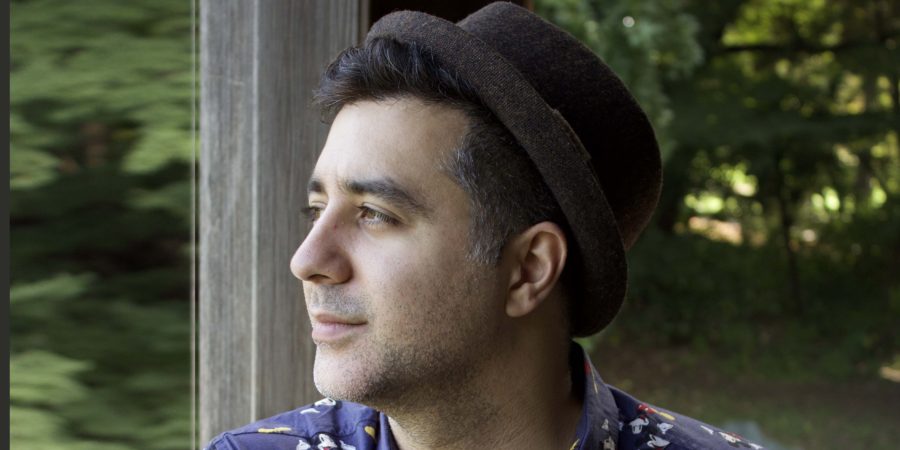Omid Razavi was born and raised in Canada, but coming from an Iranian family, he was terrified to come out as gay. Bracing himself for potential rejection, he kept his identity to himself as he fought a lifetime of internalized fears his culture had toward homosexuality.
This desire for secrecy caused a wonderful romantic relationship to end, and that was the final straw. In his late twenties, Razavi decided he could no longer live a lie, and he came out. Fortunately, his immediate family supported him and just wanted him to be happy. While it was wonderful to finally be able to live authentically, Razavi wished there had been more resources to make it feel safer and easier for him to come out earlier in life.
Razavi, now 35, currently lives in Toronto with his husband. By day, he works in the marketing communications department of an environmental nonprofit. In his free time, he’s been working on creating “Let Me Out,” a colorful pop-up book for all ages to support and encourage people through the coming out process. He’s currently running a Kickstarter campaign to raise funds needed to finish and produce the book, which ends July 14 and is close to reaching its goal.
This is Razavi’s story of coming out as gay and creating a book to serve as the resource he wished he’d had when he was younger.
Profiles in Pride: What did the coming out process look like for you?
Omid Razavi: I feel like I came out later than a lot of other people in my network and community. I came out around 27 years old. I am Middle Eastern, so I had a lot of internalized fear and thoughts. I spent my twenties trying to deny a lot of that. My best friend growing up of about 20 years is gay and came out in his early twenties, but even that didn’t give me the support system I needed. I really needed to go on my own path to discover that.
I entered into a same-sex relationship and didn’t tell anybody. It just consumed me, and not being able to share that as well as my partner at the time — he couldn’t cope with it. So we ended it, and the moment we officially ended it was when I realized I don’t ever want that to happen again. I don’t ever want to stand in my own way of being happy.
I immediately came out to my best friend; that was the first step. Following that, it became a journey of telling family and then friends. Every time you tell another person, the reaction seems to be a little bit better, or the delivery just seems that much easier. Since then, I was able to meet my husband, and we got married last year. We’ve been together for six years now. I couldn’t picture it any other way. It’s heartbreaking to think other people are still facing those fears.
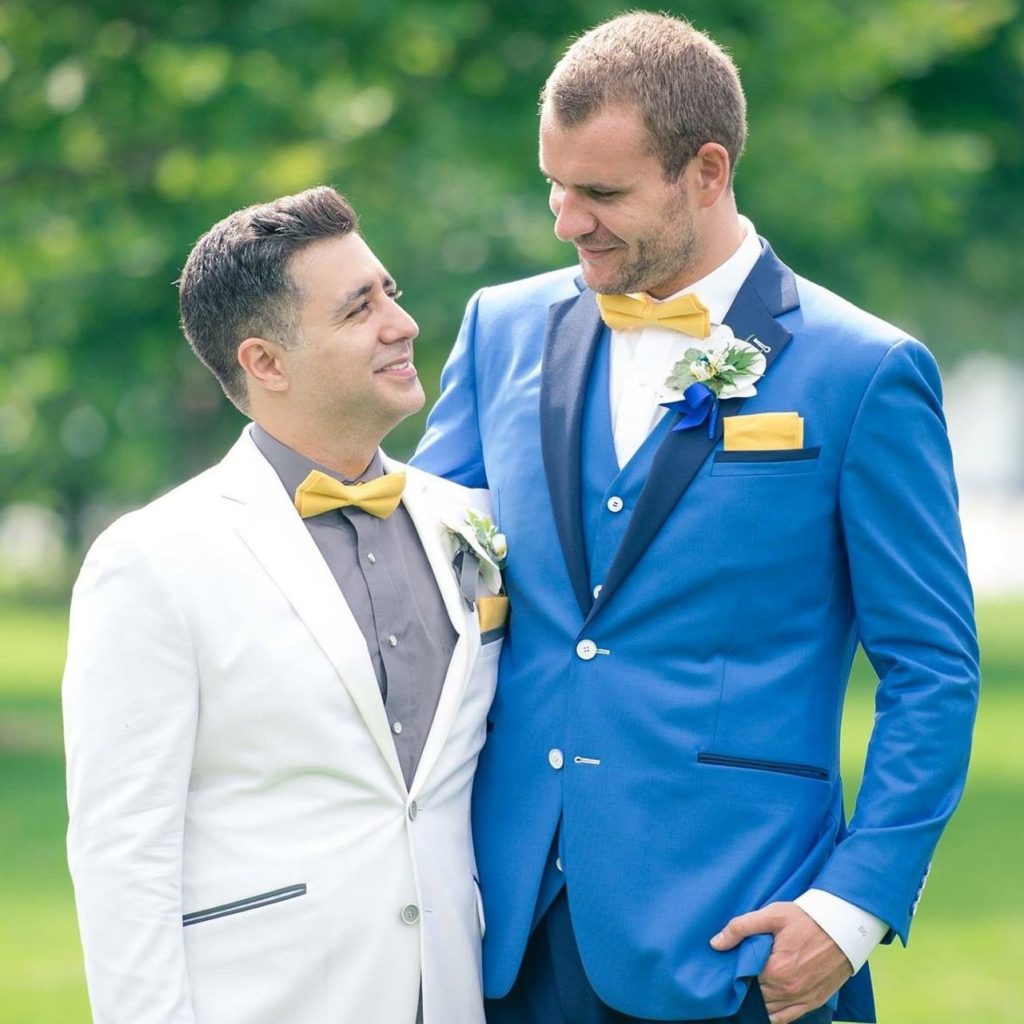
PIP: How did your parents handle your coming out?
OR: I came out to my mom first; moms always know something’s wrong. A lot of people say moms always know when you’re gay. I don’t know that I necessarily believe that, but I definitely believe in a mother’s intuition. She knew that I had something on my mind and I wasn’t myself, and it was eating me up.
So I told my mom, and I quoted what she said in my wedding vows. She said, “I just want you to be happy, and you have to put yourself first. Do not take anyone else’s views or reactions anymore; that should not be what leads your happiness. Just put yourself first and that’s all that matters.”
PIP: Can you talk a little more about how your Middle Eastern background affected your coming out process?
OR: I was born and raised in Canada, but my parents are from Iran, so I came from a country that denies the existence of homosexuality, where it is also illegal to be homosexual. I still have family there who don’t know that I’m gay, and they’re wondering why a guy in his mid-thirties still isn’t married, so they don’t know. Eventually they will find out, especially with the release of this book.
But they don’t have the exposure that we have here. It’s not part of their reality; unfortunately, it’s just not something that’s in their day-to-day conversation, so it’s a bit of a shock to them and something I don’t think they’d be able to digest.
PIP: How did you come up with the idea for “Let Me Out”?
OR: I actually have a background in animation and design, and it’s something I’ve always wanted to do. The cognitive messaging from years and years of stories and animations really made an impact on me while I was growing up.
I just had a story to tell, and I know that everybody’s coming out experience is different. I don’t think it’s one-dimensional; we all have our own journey. I wanted to tell that story, but I wanted it to make it pop out; I didn’t want the message to just be flat on the pages. I wanted it to actually pop out and be there and be seen, and have that little bit of pizazz that I think the coming experience definitely has for all of us.
I wanted to create the “Let Me Out” story to sort out the fears we all face. I start off with a little bit of an homage to The Babadook, which really took off last year and the LGBTQ community embraced it. I thought it was funny and cheeky, and I thought maybe I could play off of that a bit.
Once you really realize, OK, I’m ready to open that closet door and there’s a monster behind it, which are your internalized fears — once you’re able to open those doors, it’s a lot better and a lot brighter. The colors pop out, the messaging pops out: I am able to understand and appreciate who I am and where I want to be in life and where I want to go. These are all things I really wanted to show in the book and have fun with, and make sure the positive messaging becomes the focus of the book and the takeaway.
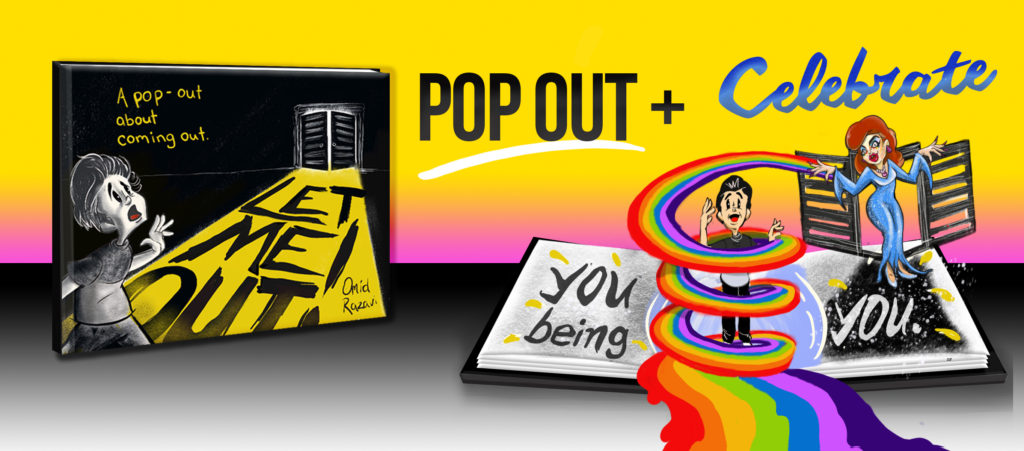
PIP: What type of audience are you creating the book for?
OR: I definitely want all ages to read it, but it is the resource I wish I’d had growing up. So I’d love it if kids of all ages could identify that there’s a definite story arc that happens here. It doesn’t necessarily need to be for the LGBT community; it could be for people having a hard time adjusting to their internalized thoughts and fears. But I also appreciate that many gay and LGBTQ adults still struggle with coming out, so I thought this would be a fun way to encourage them to be able to go that extra step and push themselves for the strength they need.
And for adults that have already come out, it’s a great piece to celebrate, because we can often forget how hard it was. My day-to-day reality now is living with my husband, waking up, having breakfast, going to work, coming home, and talking about our day. It’s so simple and it’s so easy to forget how hard the journey was to come here and make this my norm, so I think it’s also intended to be a piece that adults who have come out can appreciate and reflect their own journey as well.
PIP: I also came out late at 31, and I wish I’d had more resources when I was younger. I wonder if I would have come out sooner if I’d seen things like this growing up.
OR: Yes, I feel like I came out late at 28. I want to be an advocate. I want to be as vocal as I possibly can. Hearing you do the same thing, you’ve created an amazing platform. You came out late and it’s like you went from zero to 100, like “I spent all these years holding it back and I don’t want to spend another minute [holding back] and I also want to make sure I can actively encourage others to do the same.” It makes me so happy to hear that.
It’s such a burden to carry throughout your twenties. For many of us, our twenties are supposed to be our fun time and our time of exploration. Personally, I wish I was able to further explore my twenties and embrace who I was, but now with the happiness that I have today, I feel like everything was just meant to happen to reach that point.
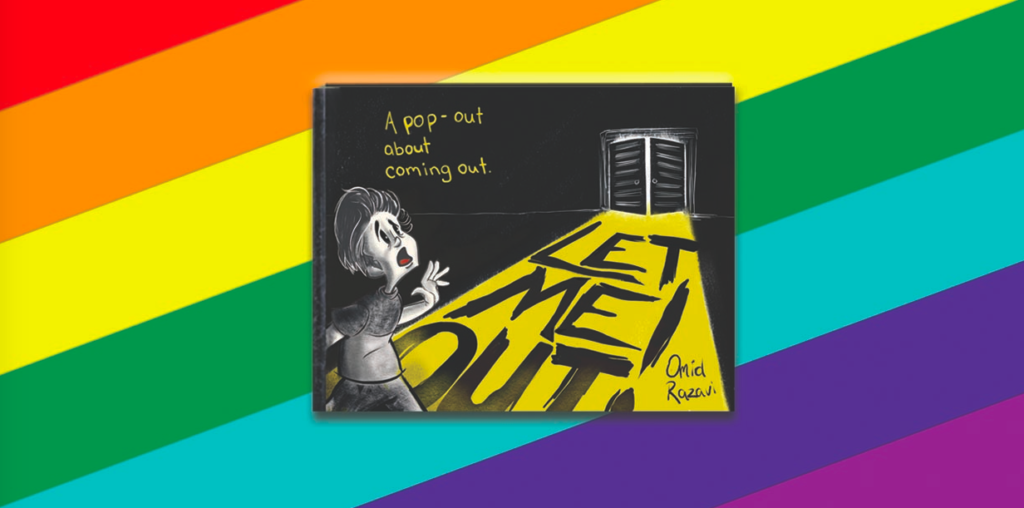
PIP: Absolutely! So where are you now in the process of creating the book?
OR: The book is written, and the drawings are mostly done. What I need the Kickstarter for is the ability to do a minimum print run. Because it’s a pop-up book, there is a minimum required. I also want it to ensure the pop-up experience really pops, so I need to enlist a paper engineer to really give me that extra level.
So what I’m hoping to do, if the campaign is successful, is I will be able to enlist the paper engineer I’ve consulted with and work with them to further develop the pop art pages and the drawings I’ve developed. That’s really one of my primary asks for this campaign.
PIP: Will people be able to buy it Amazon eventually?
OR: Yes, I’d absolutely love for it to be there. Like many other Kickstarter campaigns that are LGBT-focused for kids, I’d love for it to be an available resource they could easily access through Amazon and other vendors.
PIP: It would be amazing if there was a copy of this in libraries at schools!
OR: One of the initiatives I’m hoping to pursue once this is successful is I want to donate one book for every 10 sold to organizations that are LGBT youth-focused, whether libraries or other community organizations. I’m very fortunate to receive requests from certain libraries around the world, as well as the support of other organizations that are able to recommend smaller community organizations that deserve this.
There’s an option on the Kickstarter where you can buy a book and donate a book, which has been really popular so far. It’s truly touching to see that people are driven by that option.
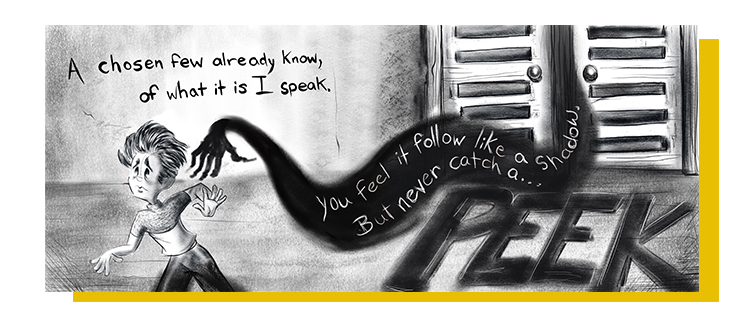
PIP: What impact do you hope “Let Me Out” will have?
OR: The other day I had a youth contact me through Instagram, and strictly through the promotions of the book and the messaging of what I’ve been saying and some of the visuals, they thanked me. They said that this whole concept, the whole book has inspired them to come out, and that it was a positive experience, which made me so happy. They really wanted to thank me for creating this resource and being one of the people who contributes to this narrative that’s so heavily required and needed.
At that moment, I felt like I won the Kickstarter campaign — I’ve reached my goal. This is what I’ve intended to do. Whether or not this is a success, that is my success. I was so touched; that’s the ultimate goal.
One of the biggest takeaways I’ve seen online is how active and confident and vocal this new wave of LGBTQ social media advocates are, especially with the trans community. They’re so confident, and they are all working toward being a resource and being very vocal about it. It’s so cool to see. That’s not something I experienced in my youth, and I’m so excited to see where this is all going and how they’re going change our futures. It’s amazing. I have a little bit of envy, but that immediately becomes so overshadowed by my pride and joy for them.
PIP: Definitely, I feel so inspired by LGBTQ youth who are so confident and proud at such a young age! Is there anything else you want to share about your life or your book?
OR: For me, it seems like this is in many ways a tool that I’m using to fully come out. One thing I’ve been told in the past is that when you come out, sometimes it’s not just a one-time thing; it’s an ongoing thing throughout your life.
So when you meet new acquaintances, see old friends you haven’t seen in a while, old employers, or in my own case, my family — this was in many ways was created as a resource to help others. But I find it incredibly helpful just for me being able to fully come out. This is what my name will be attached to. It’s not going to define me, but it’s something I’m heavily driven by.
Contribute to Omid’s Kickstarter campaign before July 14 to help make “Let Me Out” a reality!

